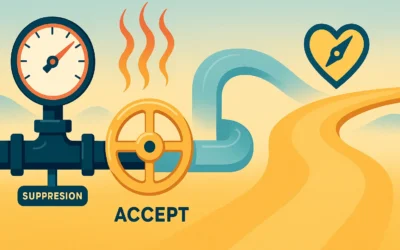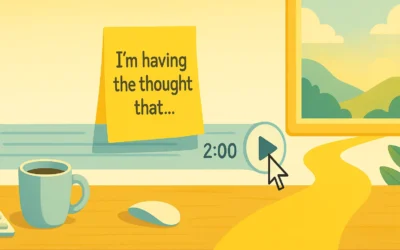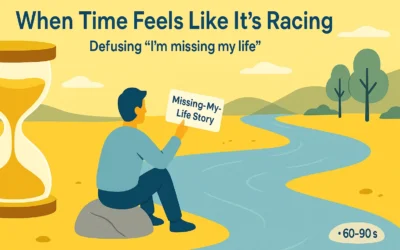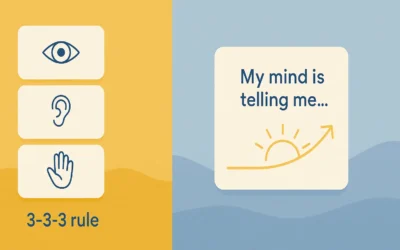When the prices rise and rents increase, our minds easily get caught up in a cycle of anxious thoughts like “I’m doomed or I’ll fall behind.” So rather than moving forward, the thoughts can quickly spiral into worst-case scenarios and leave you stuck in fear. Here, Acceptance and Commitment Therapy (ACT) can help with a skill known as defusion, which allows you to take a step back and observe such thoughts not as absolute truths but as mere words or mental stories. The reality of higher prices won’t be changed with defusion, but the way you hold onto the belief of being doomed will be changed. As you loosen the grip on that belief, you create space to react in a calmer way. This allows you to take a useful step ahead, maybe of adjusting your budget, getting some support, or just focusing on what’s under your control at the moment.
Why does this hit so hard right now?
According to the recent statistics of July 2025, Bank of America reported that 72% of young adults are actively taking steps to cope with the increasing living costs by cutting back, doing part-time work, or delaying their purchases. Adulthood has turned out to be more expensive than expected, and most people your age are feeling this.
Source: July 30, 2025 at 10:00 AM Eastern – Bank of America Newsroom
Furthermore, a survey by the Pew Research Center found that a growing number of Americans believe their financial situation will decline over the next year (28% vs. 16% the year before). In case of any emergency, only half of them said they would be able to manage three months of expenses. These figures show why money-related stress easily traps you into anxiety loops, as it’s not just internal pressure but real economic uncertainty.
Source: Thinking of US Adults About Their Personal finances
ACT in one minute: what defusion actually does
In Act’s view, money spirals as a kind of relationship problem with our words and how we get hooked by our own thoughts. Sentences like “I’ll never catch up” fuse with your attention so it becomes a solid, undeniable fact and no longer feels like just a thought or a passing worry. Which then hijacks your behavior. So instead of looking for other options, you end up getting stuck with the thought. This is where a practical mindfulness skill known as defusion jumps in. Defusion helps in stepping back and noticing the sentence as simply a string of words or text generated by your mind and not a prophecy or fact. Being able to see and recognize in this way, you loosen the grip and create freedom to choose your actions that are aligned with your values, which might be even sending an email, applying for opportunities, comparing multiple paths, or making realistic plans instead of staying caught up in never-ending doom-scrolling and spreadsheet panic.
The 90-Second “Price-Tag Panic Flip” (defusion drill)
You can practice this whenever your brain starts playing the “I’ll never catch up” track.
- The first thing is to catch the exact line. Just write down the sentence your mind brings up, for example: “I’ll never catch up.”
- The second step is to add the defusion prefix. You will say it again, but this time with some mental space: “I’m having a thought that I’ll never catch up.”
- Now try to read it once, slowly this time. Notice how this tiny shift creates distance by turning the thought into mere words, not an ultimate truth.
- Next, just name one fact you can control today. For example: “I can compare two insurance quotes,” “I can list my textbook for resale,” or “I can send one networking DM.”
- Now take a two-minute action on that fact. Keeping it short, concrete, and doable, only a small move before your mind drags you back again into the debate.
This is what ACT’s mindfulness training looks like in real life — noticing the thought, defusing from it, and then taking the next useful step.
Micro-scripts for real money moments
At the checkout (sticker shock): When you have the thought “this total means I’m failing at adulthood”, use the prefix and reframe it as “I’m having the thought that this total means I’m failing at adulthood.” Then take one small action, which could be removing a non-essential item or confirming the purchase, and then walk away from the aisle.
Rent increase email: Whenever your mind says, “This proves I’ll never get ahead,” change it to “I’m having a thought that this proves I’ll never get ahead.” From there, write just one message in response to a roommate, landlord, or to inquire about another option. One message is enough; don’t get stuck in writing again and again.
Side-hustle comparison spiral: If you get stuck in the line, “Everyone else is miles ahead”, just catch it and say, “I’m having a thought that everyone else is miles ahead.” Then move straight to the action: post a “good-enough” listing or portfolio update today. Don’t waste time on perfection, just publish.
Debt dread: Whenever you hear “This balance defines me,” change it to “I’m having a thought that this balance defines me.” Then take a small step, like making a single call (to the issuer or a counselor) or scheduling it at a set time. Mark it as done.
Why defusion beats “more information”
Whenever worry spikes, your mind goes hunting for certainty. Searching and hoping for relief, you run endless calculations, go through different advice videos, or group chats. But the more you get involved with the thought, the more it gets fed and is rarely calmed down. What can help you here is the shift in the wording by adding: “I’m having a thought that”… and then try taking the step which is in your control. In this way, you’re still moving ahead even though the numbers keep changing.
This also helps to remember that the general attitude of the public about money has turned out to be more pessimistic this year, but you’re not alone in this. Pessimism in itself is just a thought, not a destined future. What can help you hold it that way is through defusion (2).
Make it a weekly practice (mindfulness training ≠ streaks)
Choose a regular time like Sunday at 5 p.m. or the first thing on payday, and practice one quick repetition.
- Note down the loudest money thought you had in the week.
- Add the defusion prefix: “I’m having a thought that…”
- Take your two-minute desired action aligned with your values, whether it’s security, learning, generosity, or independence.
- Log it so you can track the skills you’re building, not just the expenses you’re tracking.
Try it now in MetaMindful.
Open the app → Defusion Session → Cost-of-Living Loop Breaker. In just three minutes, you will:
- Write down your exact “I’ll never catch up” line,
- Reframe it with the defusion prefix,
- Commit to one small, value-aligned action you can take today.
Mindfulness for financial anxiety isn’t about sitting still or emptying your mind. It’s about unhooking from those scary sentences just long enough to do what actually matters. Prices will keep changing, and so will thoughts. But your next move, that choice is still yours.













0 Comments